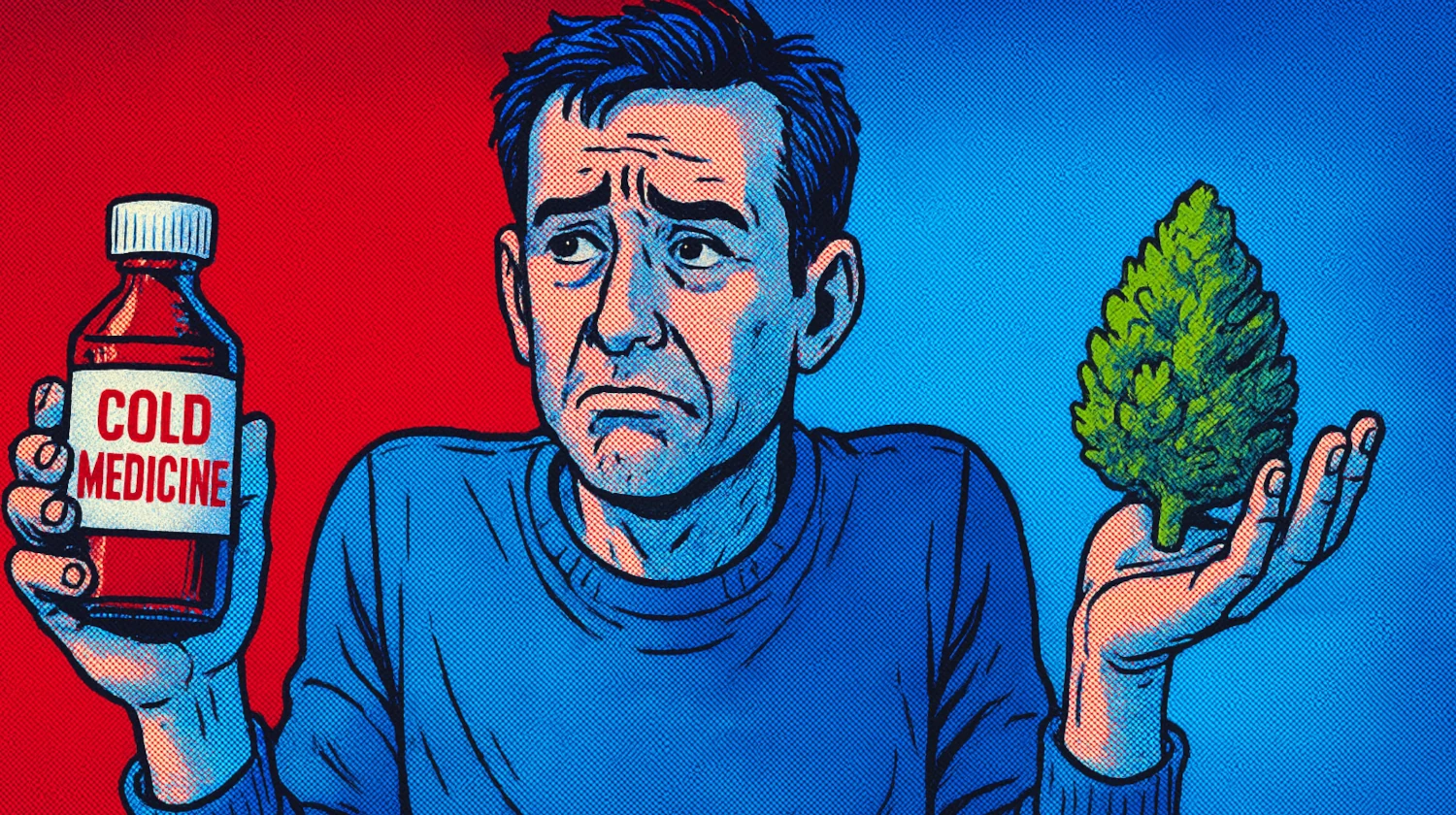In This Article
- What Research Says About Weed and NyQuil (and Other Cold Medicines)
- CBD/THC and Drug Metabolism (Why it Matters)
- What About Other Cough/Cold Products?
- Does Weed Affect Cold Symptoms?
- Possible Upsides (With Precautions)
- Important Downsides, Especially if You Smoke
- Risks of Mixing Weed and Cold Medicine (Including NyQuil)
- Can You Mix NyQuil or Cold Medicine with CBD?
- What Else Should You Not Mix with Cold Medicine?
- Why You Should Talk to Your Doctor or Pharmacist Before Using Weed and Cold Medicine
- References
Key Takeaways
- Can you mix NyQuil and weed? It’s risky. Expect stronger sedation and side effects, plus potential drug-metabolism interactions.
- Does weed help with a cold? Maybe for comfort (sleep, aches), but smoking can worsen cough/sore throat and won’t “cure” the virus.
- Safer sick-day choices: Skip smoking > Choose low-dose non-inhaled formats > Avoid alcohol-based syrups > Check labels and ask a clinician or pharmacist.
Uh oh. The “cold and flu season” fairy made a stop at your house. You collect your supplies: tissues, tea, warm socks, NyQuil…and cannabis? Some might reach for cannabis to ease aches or get some rest, so it might seem like a logical addition to your cold-fighting battle. But before you reach for TheraFlu, NyQuil, or any other OTC cold remedy, is it safe to use with weed when you’re sick?
Mixing NyQuil and weed isn’t recommended because both can make you drowsy, dizzy, or nauseated, and CBD/THC may affect how your body processes cold-medicine ingredients. If you’re sick and considering both options, consult your doctor or pharmacist first.
What Research Says About Weed and NyQuil (and Other Cold Medicines)

When you take NyQuil, you’re usually getting acetaminophen (pain/fever), dextromethorphan (cough suppressant), and doxylamine (a sleepy-time antihistamine). Some versions also include about 10% alcohol. On their own, these can make you drowsy, dizzy, or a little queasy, as cannabis can at higher doses. Together, those effects stack up. You could expect stronger sedation and a higher chance of feeling off-balance or nauseated if you mix them.
CBD/THC and Drug Metabolism (Why it Matters)
CBD can slow how your body processes some medicines by inhibiting liver enzymes (CYP450 family). If those enzymes are busy or blocked, levels of other drugs can increase, potentially amplifying side effects such as sedation, dizziness, or confusion.
Specific ingredients in cold medicines can cause other reactions with CBD, too.
- Dextromethorphan (cough suppressant) relies on CYP2D6 and other pathways; altered metabolism can change how it feels and how long it lasts.
- Doxylamine (an antihistamine) already makes most people sleepy; adding cannabis and alcohol (found in some NyQuil) can compound sedation.
- Acetaminophen (used for pain/fever relief) depends on liver processing. While its main risk is dose-related liver toxicity, CBD-linked enzyme changes and multi-drug “stacking” call for caution.1
Alcohol and cannabis mixed can intensify dizziness, drowsiness, and impaired judgment. Alcohol-containing syrups can further amplify these effects, especially next to a sedating antihistamine. That’s why the overall risk of mixing NyQuil and weed is moderate, but not insignificant, and can vary with dose, timing, and individual sensitivity. Consider seeking guidance from your doctor before using weed and Nyquil at the same time.
What About Other Cough/Cold Products?
With a tight chest or a productive cough, you might be considering using cough medicine and weed together. Whether you combine weed with Mucinex or another product, inhaled cannabis can irritate your lungs, and won’t help the outcome.
Mucinex (guaifenesin-only) is less sedating than NyQuil, but many “multi-symptom” products add dextromethorphan and/or antihistamines, which brings you right back to sedation-stack territory.
If your doctor determines a bacterial infection (not a virus) is behind your symptoms, they may prescribe an antibiotic such as amoxicillin. Although there are no cited interactions between amoxicillin and weed, smoking cannabis should be avoided.
Always scan the Drug Facts panel on the outer packaging. OTC cold meds are often combination products, and you’ll see all the included ingredients listed.
Your doctor or pharmacist is the best expert to review your treatment. In a pinch, a reputable interaction checker lets you list all your medications and cannabis to alert you to possible warnings.
Does Weed Affect Cold Symptoms?

Weed won’t cure a cold, but some people report using it for comfort, to help fall asleep, ease aches, and generally get through a rough night. Others find it worsens congestion or throat irritation, depending on the form and dose.
Possible Upsides (With Precautions)
- Pain/discomfort: A meta-analysis found cannabinoids outperformed placebo for pain in some contexts, though effect sizes and settings vary.2
- Inflammation: Some parts of cannabis (like certain cannabinoids and terpenes) have shown potential anti-inflammatory effects in early studies, which may help some people feel less achy.3,4
- Fever: Early research shows cannabis may interact with fever-related pathways, but it’s not an approved or proven treatment for viral fevers.
Important Downsides, Especially if You Smoke
With any respiratory illness, like a cough or sore throat, smoking works against you.5 Smoke irritates the throat and airways, which can trigger more coughing and worsen a sore throat when you’re already inflamed.6
If you want to use cannabis while sick, stick with non-smoked options, like edibles, tinctures, or capsules. Start low to avoid compounding sedation with cold meds.
Risks of Mixing Weed and Cold Medicine (Including NyQuil)
Some cold medicines, mixed with weed, can feel “too strong”. Here are some of the hazards:
- Sedation stack: Doxylamine plus alcohol (in some NyQuil) mixed with THC/CBD can make you very sleepy and slow reflexes.
- Metabolism matters: CBD can raise levels of certain meds (like dextromethorphan), so the same dose can hit harder or last longer.1
- GI & dizzy overlap: Both cold meds and cannabis can cause nausea or dizziness; combine them, and the risks go up.
- Smoking vs. cough: Smoking provokes coughing and throat irritation, the opposite of what you want when you’re taking a cough suppressant.5
- Acetaminophen math: Many cold meds already include acetaminophen. Don’t double-dose across products; keep your 24-hour total within label limits and avoid alcohol with acetaminophen because of liver risk.
Because cannabis research is still developing, these interactions aren’t fully understood, so effects may differ by dose, formulation, or individual metabolism.
Can You Mix NyQuil or Cold Medicine with CBD?

Short answer: Use caution. CBD isn’t intoxicating, but it can intensify how certain cold meds feel by altering metabolism and has been linked to liver enzyme elevations in some high-dose clinical trials. Patients with liver conditions should exercise caution.
If you pair CBD with a sedating antihistamine or dextromethorphan, expect more drowsiness. Cut your CBD dose, avoid alcohol-containing syrups, and ask a pharmacist if you take other meds.2
What Else Should You Not Mix with Cold Medicine?
Label warnings on cold medicines often flag alcohol and other sedatives for a reason. Extra caution with:
- Alcohol (including alcohol-based syrups): intensifies sedation and increases liver strain with acetaminophen.
- Other sedating meds/supplements (such as certain antihistamines or sleep aids): additive drowsiness and impairment.
- Stimulants (some decongestants) alongside anxiety-provoking cannabis doses: may feel jittery or uncomfortable; read labels and go low/slow.
If you’re unsure, bring the exact product box to your pharmacist for a quick interaction check, or use an online interaction checker.
Why You Should Talk to Your Doctor or Pharmacist Before Using Weed and Cold Medicine
Cannabis may help some people rest or ease aches while they’re sick, but cold medicines can add drowsiness, dizziness, and other risks when used together. For the safest plan, the right dose, right timing, and fewer side effects, always check with your clinician or pharmacist first.
Your body, doses, and medication list are unique. A five-minute pharmacist chat can help you avoid accidental acetaminophen overdosing, over-sedation, or unfriendly combinations with your prescriptions. If you have liver concerns or you’re an older adult, that check-in is especially helpful.
References
- Britch SC, Babalonis S, Walsh SL. Cannabidiol: pharmacology and therapeutic targets. Psychopharmacology. 2020;238(1):9-28. doi:https://doi.org/10.1007/s00213-020-05712-8 ↩︎
- Yanes JA, McKinnell ZE, Reid MA, et al. Effects of cannabinoid administration for pain: A meta-analysis and meta-regression. Experimental and Clinical Psychopharmacology. 2019;27(4):370-382. doi:https://doi.org/10.1037/pha0000281 ↩︎
- Ryz NR, Remillard DJ, Russo EB. Cannabis Roots: A Traditional Therapy with Future Potential for Treating Inflammation and Pain. Cannabis and Cannabinoid Research. 2017;2(1):210-216. doi:https://doi.org/10.1089/can.2017.0028 ↩︎
- Gallily R, Yekhtin Z, Hanuš LO. The Anti-Inflammatory Properties of Terpenoids from Cannabis. Cannabis and cannabinoid research. 2018;3(1):282-290. doi:https://doi.org/10.1089/can.2018.0014 ↩︎
- National Academies of Sciences E, Division H and M, Practice B on PH and PH, Agenda C on the HE of MAER and R. Respiratory Disease. National Academies Press (US); 2017. https://www.ncbi.nlm.nih.gov/books/NBK425753/ ↩︎
- Ghasemiesfe M, Ravi D, Vali M, et al. Marijuana Use, Respiratory Symptoms, and Pulmonary Function. Annals of Internal Medicine. 2018;169(2):106. doi:https://doi.org/10.7326/m18-0522 ↩︎
The information in this article and any included images or charts are for educational purposes only. This information is neither a substitute for, nor does it replace, professional legal advice or medical advice, diagnosis, or treatment. If you have any concerns or questions about laws, regulations, or your health, you should always consult with an attorney, physician or other licensed professional.




